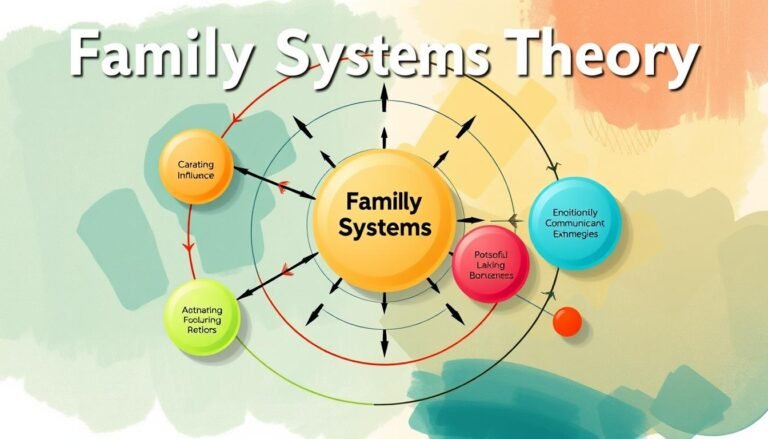Solution-Focused Brief Therapy (SFBT): A Quick Guide
Ever thought about a therapy that fixes problems in just a few sessions? Solution-Focused Brief Therapy (SFBT) could be what you need.
Steve de Shazer and Insoo Kim Berg created SFBT in the early 1980s. It changed psychotherapy by focusing on solutions, not problems. This makes it a big deal in mental health.
SFBT’s goal-focused method is loved worldwide. Therapists everywhere use it. It’s not just for one-on-one therapy. Schools, workplaces, and families also benefit from it.
In this guide, we’ll look at SFBT’s main ideas, its special techniques, and why it might be good for you. Let’s explore solution-focused therapy and see how it can help you reach your goals quickly.
Understanding Solution-Focused Brief Therapy (SFBT)
Solution-Focused Brief Therapy (SFBT) is a therapy that focuses on the positive. It was developed in the late 1970s. It helps people by using their strengths and resources.
Definition and Core Principles
SFBT is a therapy that looks to the future. It believes in finding solutions, not just talking about problems. The therapist helps clients find their strengths to reach their goals.
Historical Development
Steve de Shazer and Insoo Kim Berg started SFBT in the late 1970s. They worked at the Milwaukee Brief Family Therapy Center. It quickly became popular in many fields, not just mental health.
Key Differences from Traditional Therapy
SFBT is different from traditional therapy. It doesn’t focus on the past or analyze problems deeply. Instead, it:
- Helps set clear goals
- Finds exceptions to problems
- Builds on strengths and successes
- Works on solutions, not past issues
This therapy is short, lasting 5-8 sessions. It’s efficient and affordable. Studies show it works well for many issues, like addiction and depression.
The SFBT Process: From Problem to Solution
Solution-Focused Brief Therapy (SFBT) turns problems into solutions in a special way. It focuses on setting goals, finding resources, and tracking progress.
Goal Setting and Future Focus
SFBT begins with setting clear, achievable goals. Therapists help clients dream about their future. This helps them move past old problems and look forward to new possibilities.
Identifying Exceptions and Previous Solutions
Therapists help clients find times when their problem wasn’t as bad. By looking at these moments, clients discover their own strengths and past successes. This boosts their confidence and opens the door to new solutions.
Scaling Questions and Progress Tracking
SFBT uses scaling questions to see how far clients have come. Clients rate their situation on a scale from 0 to 10. This method helps track progress and keeps clients motivated to reach their goals.
| SFBT Technique | Purpose | Example |
|---|---|---|
| Goal-setting | Define desired outcomes | “What would your ideal future look like?” |
| Exception finding | Identify existing solutions | “When was the problem less severe?” |
| Scaling questions | Track progress | “On a scale of 0-10, how close are you to your goal?” |
Studies show SFBT works well. A 2017 meta-analysis in Family Process found it effective in parent training. Another study in the International Journal of Group Psychotherapy showed its success in schools.
Key Techniques in Solution-Focused Brief Therapy (SFBT)
Solution-focused brief therapy uses special techniques to help clients make positive changes. These methods focus on building solutions, not just analyzing problems. Let’s look at some key SFBT techniques.
The miracle question is a key tool in SFBT. It asks clients to imagine waking up to find their problem solved. This helps them envision their ideal future and set goals. Exception-finding is also crucial. It looks for times when the problem was less severe, showing existing strengths and coping skills.
Coping questions help find client resources. They ask how people have handled past difficulties. These questions boost confidence and resilience. Scaling questions let clients rate their progress, making it easier to understand.
| SFBT Technique | Purpose | Example |
|---|---|---|
| Miracle Question | Envision ideal future | “If you woke up tomorrow and your problem was solved, what would be different?” |
| Exception-Finding | Identify existing strengths | “When was the last time you felt better? What was different then?” |
| Coping Questions | Uncover resources | “How have you managed to keep going despite these challenges?” |
| Scaling Questions | Track progress | “On a scale of 1-10, how close are you to your goal today?” |
These solution-focused interventions work together to create a positive, goal-oriented therapy experience. They help clients tap into their own wisdom and resources, leading to quicker, more sustainable change.
Benefits and Applications of SFBT
Solution-Focused Brief Therapy (SFBT) is a powerful approach. It focuses on clients’ strengths, leading to positive results. This model is used for many issues.
Time and Cost-Effectiveness
SFBT is known for its efficiency. Sessions usually last 5-8 meetings, sometimes just one. It’s great for those looking for quick help.
| Aspect | SFBT | Traditional Therapy |
|---|---|---|
| Duration | 1-2 months | Several months to years |
| Sessions | 5-8 sessions | 20+ sessions |
| Focus | Present and future | Past and present |
Empowerment and Client-Led Approach
SFBT empowers clients by letting them set goals. It’s a team effort that boosts communication. This helps improve relationships with loved ones.
Versatility in Treating Various Issues
SFBT is effective for many issues. It helps with depression, anxiety, addiction, and more. It’s proven to work for different problems worldwide.
“SFBT techniques have demonstrated wide relevance in psychosocial interventions on a global scale, offering hope and empowerment to clients facing various challenges.”
Conclusion
Solution-Focused Brief Therapy (SFBT) is a strong, evidence-based therapy that’s gaining popularity. It works well in many settings and with different people. A study of 22 research papers found good results, with 82% from the USA.
This therapy focuses on finding solutions, not just problems. It helps people find their strengths and make positive changes. It’s especially good at helping with mental health issues, with a success rate of 0.26.
SFBT is also great for kids’ school problems, adult mental health, and even helping people get back to work. It’s quick and effective, making it a favorite among both clients and therapists. Most sessions use three to four key SFBT methods, led by skilled counselors or graduate interns.
This approach highlights clients’ strengths and resources. It makes SFBT a valuable part of today’s therapy world. It offers a quick and lasting way to bring about positive change.
Source Links
- Solution–Focused Brief Therapy Overview, Solution&n…
- An Introduction to Solution-Focused Brief Therapy (SFBT)
- Solution-focused approaches in adult mental health research: A conceptual literature review and narrative synthesis
- What is Solution-Focused Therapy · Solution-Focused Therapy Institute
- What Is Solution Focused Brief Therapy?
- What Is Solution Focused Brief Therapy (SFBT)?
- Solution-Focused Brief Therapy · Solution-Focused Therapy Institute
- 7 Powerful Strategies for Rapid Change: Solution-Focused Brief Therapy Revealed! | Maitri Path to Wellness, PLLC
- Solution-focused brief therapy: a review of the outcome research – PubMed
- What is Solution-focused therapy (SFBT)
- Solution-focused brief therapy
- Top Solution Focused Therapy Techniques
- 5 Benefits of Solution-Focused Therapy
- Solution-Focused Brief Therapy: Techniques, Goals, and Benefits
- Solution-focused Brief Therapy: Benefits, Techniques | Thriveworks
- Examining the effectiveness of solution-focused brief therapy: a meta-analysis – Database of Abstracts of Reviews of Effects (DARE): Quality-assessed Reviews
- Effectiveness of solution-focused brief therapy: a systematic qualitative review of controlled outcome studies – Database of Abstracts of Reviews of Effects (DARE): Quality-assessed Reviews
- Solution-Focused Brief Therapy: Strengths and Resources – SWEET INSTITUTE – Continuing Education for Mental Health Professionals








